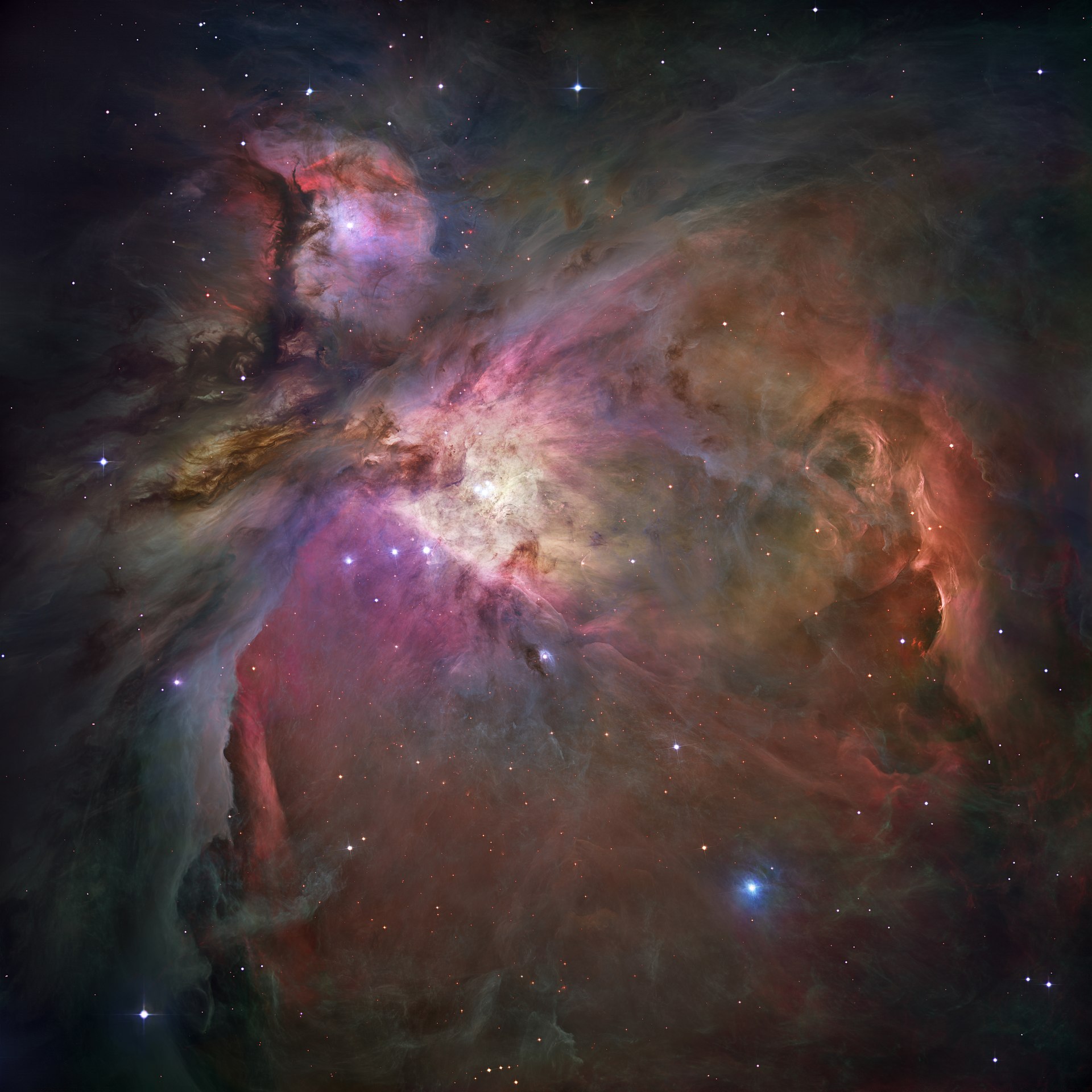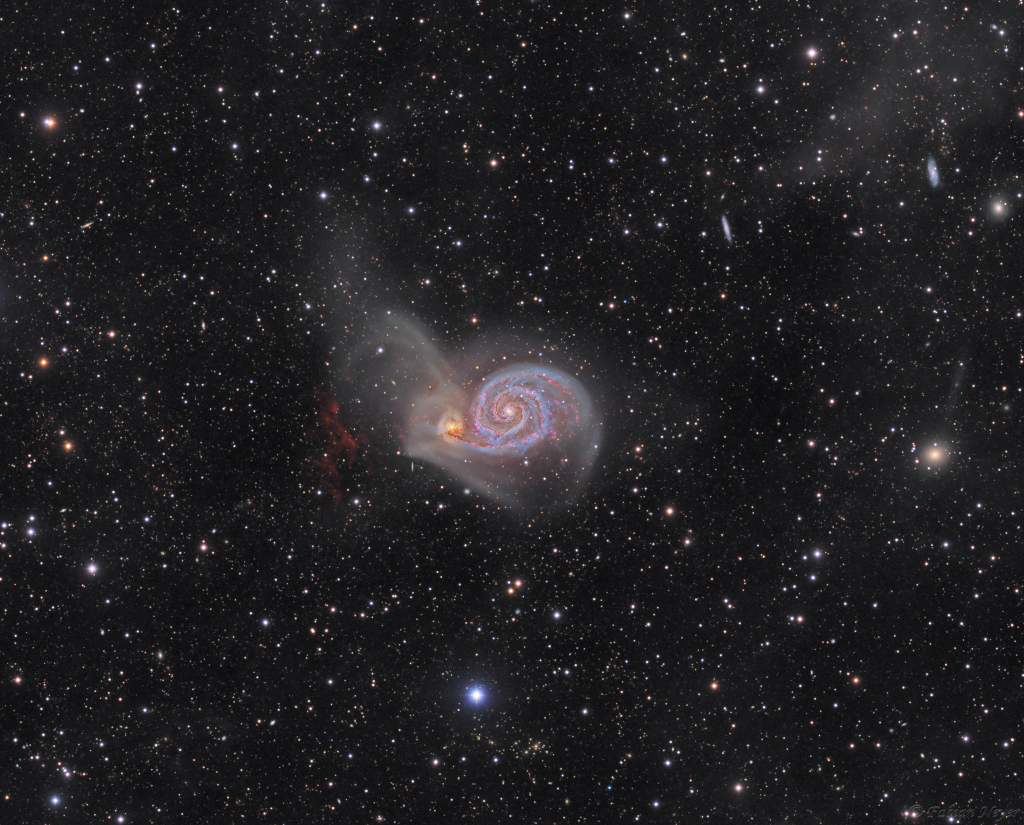Blog
This dramatic image offers a peek inside a cavern of roiling dust and gas where thousands of stars are forming. The image, taken by the Advanced Camera for Surveys (ACS) aboard NASA/ESA Hubble Space Telescope, represents the sharpest view ever taken of this region, called the Orion Nebula. More than 3,000 stars of various sizes appear in this image. Some of them have never been seen in visible light. These stars reside in a dramatic dust-and-gas landscape of plateaus, mountains, and valleys that are reminiscent of the Grand Canyon. The Orion Nebula is a picture book of star formation, from the massive, young stars that are shaping the nebula to the pillars of dense gas that may be the homes of budding stars. The bright central region is the home of the four heftiest stars in the nebula. The stars are called the Trapezium because they are arranged in a trapezoid pattern. Ultraviolet light unleashed by these stars is carving a cavity in the nebula and disrupting the growth of hundreds of smaller stars. Located near the Trapezium stars are stars still young enough to have disks of material encircling them. These disks are called protoplanetary disks or “proplyds” and are too small to see clearly in this image. The disks are the building blocks of solar systems. The bright glow at upper left is from M43, a small region being shaped by a massive, young star’s ultraviolet light. Astronomers call the region a miniature Orion Nebula because only one star is sculpting the landscape. The Orion Nebula has four such stars. Next to M43 are dense, dark pillars of dust and gas that point toward the Trapezium. These pillars are resisting erosion from the Trapezium’s intense ultraviolet light. The glowing region on the right reveals arcs and bubbles formed when stellar winds – streams of charged particles ejected from the Trapezium stars – collide with material. The faint red stars near the bottom are the myriad brown dwarfs that Hubble spied for the first time in the nebula in visible light. Sometimes called “failed stars,” brown dwarfs are cool objects that are too small to be ordinary stars because they cannot sustain nuclear fusion in their cores the way our Sun does. The dark red column, below, left, shows an illuminated edge of the cavity wall. The Orion Nebula is 1,500 light-years away, the nearest star-forming region to Earth. Astronomers used 520 Hubble images, taken in five colours, to make this picture. They also added ground-based photos to fill out the nebula. The ACS mosaic covers approximately the apparent angular size of the full moon. The Orion observations were taken between 2004 and 2005.

Freddie King (September 3, 1934 – December 28, 1976) was an American blues guitarist, singer and songwriter. He is considered one of the “Three Kings of the Blues Guitar” (along with Albert King and B.B. King, none of whom were blood related). Mostly known for his soulful and powerful voice and distinctive guitar playing, King had a major influence on electric blues music and on many later blues guitarists.
Born in Gilmer, Texas, King became acquainted with the guitar at the age of six. He started learning the guitar from his mother and his uncle. King moved to Chicagowhen he was a teenager; there he formed his first band the Every Hour Blues Boys with guitarist Jimmie Lee Robinson and drummer Frank “Sonny” Scott. As he was repeatedly being rejected by Chess Records, he got signed to Federal Records, and got his break with single “Have You Ever Loved a Woman” and instrumental “Hide Away“, which reached number five on the Billboard magazine’s rhythm and blues chart in 1961. It later became a blues standard. King based his guitar style on Texas blues and Chicago blues influences. The album Freddy King Sings showcased his singing talents and included the record chart hits “You’ve Got to Love Her with a Feeling” and “I’m Tore Down”. He later became involved with producers who were more oriented to rhythm and blues and rock and was one of the first bluesmen to have a multiracial backing band at performances.
He was inducted into the Rock and Roll Hall of Fame by ZZ Top in 2012 and into the Blues Hall of Fame in 1982. His instrumental “Hide Away” was included in the Rock and Roll Hall of Fame’s list of “500 Songs that Shaped Rock“. He was ranked 25th in the Rolling Stone magazine’s 2003 edition of “100 Greatest Guitarists of All Time” and 15th in the 2011 edition.
According to his birth certificate he was named Fred King, and his parents were Ella Mae King and J. T. Christian. When Freddie was six years old, his mother and his uncle began teaching him to play the guitar. In autumn 1949, he and his family moved from Dallas to the South Side of Chicago.
more...Granville William “Mickey” Roker (September 3, 1932 – May 22, 2017) was an American jazz drummer.
Roker was born into extreme poverty in Miami to Granville (Sr.) and Willie Mae Roker. After his mother died (his father never lived with them), when he was only ten, he was taken by his grandmother to live in Philadelphia with his uncle Walter, who gave him his first drum kit and communicated his love of jazz to his nephew. He also introduced the young Roker to the jazz scene in Philadelphia, where drummer Philly Joe Jones became Roker’s idol. While in Philadelphia he played with Jimmy Oliver, Jimmy Heath, Jimmy Divine, King James and Sam Reed before moving to New York in 1959, where his first gigs were with Gigi Gryce, Ray Bryant, Joe Williams, Junior Mance, Nancy Wilson and the Duke Pearson big band.
more...Shoista Mullojonova (Tajik: Шоиста Муллоҷонова, Persian: شایسته ملاجانآوا, Russian: Шоиста Рубиновна Муллоджанова; September 3, 1925 – June 26, 2010), born Shushana Rubinovna Mullodzhanova, was a renowned Tajik-born Bukharian Jewish Shashmakom singer.
She was born in Dushanbe, Tajik ASSR to a religious Bukharian Jewish family. Her mother, Sivyo Davydova, was from Samarkand and her father, Rubin Mullodzhanov, originally came from Bukhara. Her family traces its ancestry to an artistocratic Levite tribe that has been into performing and entertaining since the time of the First and Second Temple in Jerusalem.
more...John Len Chatman (September 3, 1915 – February 24, 1988), known professionally as Memphis Slim, was an American blues pianist, singer, and composer. He led a series of bands that, reflecting the popular appeal of jump blues, included saxophones, bass, drums, and piano. A song he first cut in 1947, “Every Day I Have the Blues“, has become a blues standard, recorded by many other artists. He made over 500 recordings. He was posthumously inducted into the Blues Hall of Fame in 1989.
Memphis Slim was born John Len Chatman, in Memphis, Tennessee. For his first recordings, for Okeh Records in 1940, he used the name of his father, Peter Chatman (who sang, played piano and guitar, and operated juke joints); it is commonly believed that he did so to honor his father. He started performing under the name “Memphis Slim” later that year but continued to publish songs under the name Peter Chatman.
more...Subbing for Mr O’Keefe today accompanying cantor Inbal Sharett-Singer at Temple Israel’s Friday Shabbat Service.
more...Find the Big Dipper and follow the handle away from the dipper’s bowl until you get to the last bright star. Then, just slide your telescope a little south and west and you’ll come upon this stunning pair of interacting galaxies, the 51st entry in Charles Messier’s famous catalog. Perhaps the original spiral nebula, the large galaxy with well defined spiral structure is also cataloged as NGC 5194. Its spiral arms and dust lanesclearly sweep in front of its companion galaxy (left), NGC 5195. The pair are about 31 million light-years distant and officially lie within the angular boundaries of the small constellation Canes Venatici. In direct telescopic views, M51 looks faint and fuzzy to the eye. But this remarkably deep image shows off details of the interacting galaxy’s striking colors and galactic tidal debris. The image includes nearly 90 hours of narrowband data that also reveals a vast glowing cloud of reddish ionized hydrogen gas discovered in the M51 system.

William Everett Preston (September 2, 1946 – June 6, 2006) was an American musician, whose work encompassed R&B, rock, soul, funk, and gospel. Preston was a top session keyboardist in the 1960s, during which he backed artists such as Little Richard, Sam Cooke, Ray Charles, the Everly Brothers, Reverend James Cleveland, the Beatles and the Rolling Stones. He gained attention as a solo artist with hit singles such as “That’s the Way God Planned It“, the Grammy-winning “Outa-Space“, “Will It Go Round in Circles“, “Space Race“, “Nothing from Nothing“, and “With You I’m Born Again“. Additionally, Preston co-wrote “You Are So Beautiful“, which became a #5 hit for Joe Cocker.
Preston is the only non-Beatle musician to be given a credit on a Beatles recording at the band’s request; the group’s 1969 single “Get Back” was credited as “The Beatles with Billy Preston”. He continued to record and perform with George Harrison after the Beatles’ breakup, along with other artists such as Eric Clapton, and the Rolling Stones on many of the group’s albums and tours during the 1970s. On May 12, 2021, the Rock and Roll Hall of Fame announced that Preston would be inducted with the Musical Excellence Award.
more...Clifford Laconia Jordan (September 2, 1931 – March 27, 1993) was an American jazz tenor saxophone player. While in Chicago, he performed with Max Roach, Sonny Stitt, and some rhythm and blues groups. He moved to New York City in 1957, after which he recorded three albums for Blue Note. He recorded with Horace Silver, J.J. Johnson, and Kenny Dorham, among others. He was part of the Charles Mingus Sextet, with Eric Dolphy, during its 1964 European tour.
Jordan toured Africa with Randy Weston, and performed in Paris while living in Belgium. In later years, he led his own groups, performed with Cedar Walton‘s quartet Eastern Rebellion, and led a big band.
Jordan was married to Shirley Jordan, a designer and former owner of Clothing Manufacturing Corporation in New York. He later married Sandy Jordan (née Williams), a graphic artist and Honorary Founders Board member of the Jazz Foundation of America.
more...Horace Ward Martin Tavares Silver (September 2, 1928 – June 18, 2014 Norwalk, CT) was an American jazz pianist, composer, and arranger, particularly in the hard bop style that he helped pioneer in the 1950s.
After playing tenor saxophone and piano at school in Connecticut, Silver got his break on piano when his trio was recruited by Stan Getz in 1950. Silver soon moved to New York City, where he developed a reputation as a composer and for his bluesy playing. Frequent sideman recordings in the mid-1950s helped further, but it was his work with the Jazz Messengers, co-led by Art Blakey, that brought both his writing and playing most attention. Their Horace Silver and the Jazz Messengers album contained Silver’s first hit, “The Preacher“. After leaving Blakey in 1956, Silver formed his own quintet, with what became the standard small group line-up of tenor saxophone, trumpet, piano, bass, and drums. Their public performances and frequent recordings for Blue Note Records increased Silver’s popularity, even through changes of personnel. His most successful album was Song for My Father, made with two iterations of the quintet in 1963 and 1964.
Several changes occurred in the early 1970s: Silver disbanded his group to spend more time with his wife and to concentrate on composing; he included lyrics in his recordings; and his interest in spiritualism developed. The last two of these were often combined, resulting in commercially unsuccessful releases such as The United States of Mind series. Silver left Blue Note after 28 years, founded his own record label, and scaled back his touring in the 1980s, relying in part on royalties from his compositions for income. In 1993, he returned to major record labels, releasing five albums before gradually withdrawing from public view because of health problems.
As a player, Silver transitioned from bebop to hard bop by stressing melody rather than complex harmony, and combined clean and often humorous right-hand lines with darker notes and chords in a near-perpetual left-hand rumble. His compositions similarly emphasized catchy melodies, but often also contained dissonant harmonies. Many of his varied repertoire of songs, including “Doodlin’“, “Peace“, and “Sister Sadie“, became jazz standardsthat are still widely played. His considerable legacy encompasses his influence on other pianists and composers, and the development of young jazz talents who appeared in his bands over the course of four decades.
more...Laurindo Almeida (September 2, 1917 – July 26, 1995) was a Brazilian guitarist and composer in classical, jazz, and Latin music. He and Bud Shankwere pioneers in the creation of bossa nova. Almeida was the first guitarist to receive Grammy Awards for both classical and jazz performances. His discography encompasses more than a hundred recordings over five decades.
more...The Farruca is a dramatic, dance-centric form charactized by sombre virtuosity, aggressive footwork, and dramatic shifts in tempo. “Farruco/a” is a slang term used in Andalucía and Latin America to refer to someone from the Spanish provinces of Galicia or Asturias who is far from home. The flamenco form Farruca has little to do with the music of northern Spain, though some of the melodic themes associated with the farruca are reminiscent of tunes from Galicia.
The Farruca was created by guitarist Ramón Montoya and flamenco dancer Faíco. Based on the Tangos Gitano, it is a four-count form with a strong emphasis on the first beat. It is in a minor key, as opposed to the major phrygian mode usually associated with Tangos Gitanos.
more...Teaching a Rhythm Roots Workshop Residency for Tasks Unlimited (https://tasksunlimited.org) Running Thursday mornings 930-11am for seven weeks September 1st thru October 13th. Based on the Fairweather Lodge Model Tasks Unlimited provides supported employment, housing and recovery services for people with mental illness so that they achieve a full life with the rights and responsibilities of adults in our society. Participants with Celebrate Cultures through a world drumming experience.

Framing a bright emission region, this telescopic view looks out along the plane of our Milky Way Galaxy toward the nebula rich constellation Cygnus the Swan. Popularly called the Tulip Nebula, the reddish glowing cloud of interstellar gas and dust is also found in the 1959 catalog by astronomer Stewart Sharpless as Sh2-101. Nearly 70 light-years across, the complex and beautiful Tulip Nebula blossoms about 8,000 light-years away. Ultraviolet radiation from young energetic stars at the edge of the Cygnus OB3 association, including O star HDE 227018, ionizes the atoms and powers the emission from the Tulip Nebula. Also in the field of view is microquasar Cygnus X-1, one of the strongest X-ray sources in planet Earth’s sky. Blasted by powerful jets from a lurking black hole its fainter bluish curved shock front is only just visible though, beyond the cosmic Tulip’s petals near the right side of the frame.

Akiko Tsuruga (敦賀明子, Tsuruga Akiko) 9-1-1967 is a jazz composer, Hammond B-3 organist and pianist from Osaka, Japan.
She was born in Osaka. Her parents bought her a small organ when she was three and she started learning to play standards. At high school, she listened to Hammond B3 players including Jimmy Smith, then Charles Earland, Jack McDuff, Jimmy McGriff and Dr. Lonnie Smith.
A graduate of the Osaka College of Music, she has resided in New York City since 2001. After moving to the US, she had lessons from Lonnie Smith.
In addition to her solo work, she plays as a sideman in various groups in New York. She has accompanied Lou Donaldson since 2007.
more...
Gene Harris (born Eugene Haire, September 1, 1933 – January 16, 2000 Benton Harbor, MI) was an American jazz pianist known for his warm sound and blues and gospel infused style that is known as soul jazz.
From 1956 to 1970, he played in The Three Sounds trio with bassist Andy Simpkins and drummer Bill Dowdy. During this time, The Three Sounds recorded regularly for Blue Note and Verve.
He mostly retired to Boise, starting in the late 1970s, although he performed regularly at the Idanha Hotel there. Ray Brown convinced him to go back on tour in the early 1980s. He played with the Ray Brown Trio and then led his own groups, recording mostly on Concord Records, until his death from kidney failure in 2000. One of his most popular numbers was his “Battle Hymn of the Republic,” a live version of which is on his Live at Otter Crest album, published by Concord. The singer and actress Niki Haris is his daughter.
more...More Posts
- Bernard Purdie Day
- Shelly Manne Day
- World Music with Orchestre National de Barbés
- Daily Roots with Bunny Wailer & Ruffi-Ann
- The Cosmos with NGC 6543
- Gary Thomas Day
- João Gilberto Day
- Howlin’ Wolf Day
- Chink Martin Day
- World Music with Samba Touré
- Daily Roots with Alpha & Omega
- The Cosmos with Abell 3827
- Kenny Barron Day
- Les Paul Day
- Cole Porter Day
- World Music with Zemari Zerfe Kebede
- Daily Roots with Scientist
- The Cosmos with NGC 346
- Boz Scaggs Day
- Bill Watrous Day